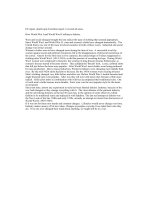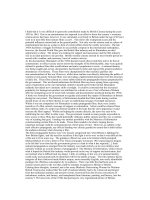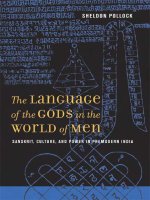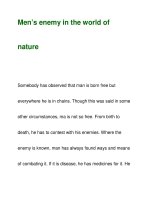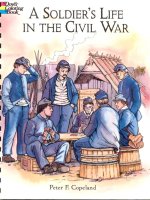Changing englishness in first world war poetry
Bạn đang xem bản rút gọn của tài liệu. Xem và tải ngay bản đầy đủ của tài liệu tại đây (252.87 KB, 112 trang )
CHANGING ENGLISHNESS IN FIRST WORLD WAR
POETRY
KHOR KUAN MIN
(B.A. (Hons), NUS)
A THESIS SUBMITTED FOR THE DEGREE OF
MASTER OF ARTS
DEPARTMENT OF ENGLISH LANGUAGE AND
LITERATURE
NATIONAL UNIVERSITY OF SINGAPORE
2012
DECLARATION
I hereby declare that this thesis is my original work and it has been written by me in
its entirety. I have duly acknowledged all sources of information which have been
used in the thesis.
This thesis has also not been submitted for any degree in any university previously.
_________________________
Khor Kuan Min
20 July 2012
i
ACKNOWLEDGEMENTS
I would like to thank Professor John Richardson for supervising me throughout the
period of writing this thesis, and providing invaluable feedback and advice.
I would also like to thank Professor Jane Nardin for reading certain parts of the thesis
and providing suggestions for improvement.
ii
CONTENTS
Chapter 1
Introduction ......................................................................................................... 1
Chapter 2
The Georgians and English History ................................................................... 10
Changing Englishness (Chapters 3–5)
Chapter 3
Place ................................................................................................................. 22
3.1 Transplanting England .................................................................... 28
3.2 An (Ironically) Ideal England ........................................................... 40
Chapter 4
People .............................................................................................................. 46
4.1 Dilution of International Boundaries ............................................... 48
4.2 Dilution of Class ............................................................................. 56
4.3 The English Remnant ..................................................................... 62
Chapter 5
Conservatism .................................................................................................... 69
5.1 Class ............................................................................................... 69
5.2 Language and Form ........................................................................ 79
~
iii
Chapter 6
Conclusion ....................................................................................................... 93
List of Works Cited ....................................................................................... 102
iv
SUMMARY
This thesis examines, via close analysis of relevant poems, how the first-hand
experience of the First World War changed the prominent war poets’ collective vision
of England. The England of the pre-war poetic consciousness, as represented by the
Georgian poets, was transformed by the unique experience of fighting in the biggest
and most destructive war at that point in time. Two key aspects of this new vision of
England are examined – ‘Place’ and ‘People’. England as a place is depicted as
vividly as the war poets’ immediate environment of trenches and battlefields, despite
their physical isolation from their home country.
This England, like that of the
Georgians, is predominantly rural, but is also depicted with more realism and detail.
This view of England sprang from the war poets’ heightened sensitivities created by
the war experience, their nostalgia, and their desire to end the war by contrasting its
realities with ideal English landscapes. Yet in their isolation, the war poets also came
to conceive of a new, more egalitarian England overseas, defined primarily in terms
of their fellow soldiers. Traditional divisions of nationality and class were attenuated,
replaced by the soldier-civilian divide.
The old England, viewed in terms of its
civilians who are mostly ignorant of the war’s realities and hence exist in a world
apart, was viewed as inadequate and morally inferior. Nevertheless, the war poets’
vision was still fundamentally conservative as it remained rooted in tradition, a
tradition most apparent in their treatments of class and language.
Despite the
dilution of class boundaries, the traditional class system was still carried over to the
trenches, and is most visible in the war poets’ simplistic depictions of soldiers from
the lower classes. Their use of traditional language and forms, for instance the
sonnet, also aligned them with the past, unlike their Modernist contemporaries. Their
vision of England is a distinctive but limited one, despite the shaping influence of the
war experience.
v
CITATIONS
This thesis generally uses the MLA in-text citation method, with some modifications.
For primary references, if the title of the poem quoted is already given in the text,
only the relevant lines are cited in parentheses:
The last poem in Gurney’s sequence, ‘England the Mother’, offers what seems to be a
straightforward tribute to England in a manner similar to Brooke’s: ‘Death impotent, by
boys bemocked at, who / Will leave unblotted in the soldier-soul / Gold of the daffodil,
the sunset streak, / The innocence and joy of England’s blue’ (11–4).
If the poem title is not in the text, it is included in parentheses:
England is no longer viewed through the indulgently patriotic lens of Brooke, who fails
to comprehend, or at least glosses over entirely, the uglier side of war and his country’s
complicity in it: ‘If I should die, think only this of me: / That there’s some corner of a
foreign field / That is forever England. There shall be / In that rich earth a richer dust
concealed’ (‘The Soldier’, 1–4).
On occasion, if there is the possibility that poem citations are not immediately clear or
could be confused with secondary-source citations, the prefix ‘l.’ or ‘ll.’ (for
‘line’/‘lines’) is included before the poem line(s):
British history, even pre-1707, can arguably be defined by the many wars fought
against various opponents, for instance the multiple conflicts with France and Spain,
the American Revolutionary War, and, as in Rudyard Kipling’s ‘The White Man’s
Burden’, the ‘savage wars of peace’ (l.18) fought in the name of imperial expansion and
domination.
For prose quotations from poets (e.g. letters), the title of the publication (shortened if
the poet’s identity is clear) from which the quotation is taken is given, followed by the
page no(s), e.g. (Collected Works 373). If the quotation is taken from a secondary
source, due acknowledgement is made, e.g. (Cited in Egremont 144).
vi
For citations of secondary material, the standard form is ‘Surname-Page no(s)’ in
parentheses, e.g. (Colley 6). If the author’s name is made clear in the text, only the
page no(s) is/are given:
As Martin Stephen observes, ‘[t]he Georgians were only prepared to write about what
they knew and had experienced personally’ (29), and the poet’s lines certainly suggest
he is writing from direct experience.
However, if the author’s name is in the text but it is not entirely clear if the
subsequent citation is attributed to him/her, the standard form will apply. If two or
more publications by the same author are included in the List of Works Cited, the
year of the relevant publication is also included, e.g. (Lucas 1986, 75). If the years
are also the same, the title of the publication is used instead:
As Jean Moorcroft Wilson elaborates, ‘[i]t is important to remember that Sorley was
“helplessly angry”... about war from the start, for it shows greater maturity and
discernment than most of his contemporaries. Very few soldier-poets realized the
futility of war at such an early stage’ (Charles Hamilton Sorley: A Biography 157).
vii
Chapter 1
Introduction
In 1917, Ivor Gurney published a five-sonnet sequence, ‘Sonnets 1917’, dedicated to
the memory of Rupert Brooke and clearly inspired by Brooke’s own famous fivesonnet sequence entitled ‘1914’. The last poem in Gurney’s sequence, ‘England the
Mother’, offers what seems to be a straightforward tribute to England in a manner
similar to Brooke’s: ‘Death impotent, by boys bemocked at, who / Will leave unblotted
in the soldier-soul / Gold of the daffodil, the sunset streak, / The innocence and joy of
England’s blue’ (11–4).
Yet this unequivocally patriotic conclusion and idealised
depiction of England is at odds with the first part of the sonnet, which expresses a far
more troubled and ambiguous view of England: ‘We have done our utmost, England,
terrible / And dear taskmistress, darling Mother and stern’ (1–2). The poet describes
how he and fellow soldiers ‘watch your [England’s] eyes that tell / To us all secrets,
eyes sea-deep that burn / With love so long denied; with tears discern / The scars
and haggard look of all that hell’ (5–8). Despite Gurney’s loyalty to England, his
feelings for it have been complicated by his experience of fighting in the First World
War in its name, resulting in a tortured and somewhat paradoxical and vacillating
depiction of his country. England might be a ‘darling Mother’, but it is also a ‘stern’
and ‘terrible’ one that withholds its love yet, nevertheless, recognises and grieves the
‘scars and haggard look of all that hell’ inflicted on its children on its account.
Gurney’s oxymoronic ‘dear taskmistress’ encapsulates his highly conflicted view of a
country he loves but, unlike Brooke, can never see in simplistically patriotic or
nationalistic terms due to his acute awareness of the suffering imposed and endured
on its behalf.
Gurney’s poem, and other similarly complex and conflicted poems by him
(e.g. ‘Strange Service’) and others, reveals the impact of the First World War on the
1
perception of England and sense of Englishness of the poets who fought in it and
engaged it in their writing. The work of these poets delineates a broad trend that
complicates prior perceptions of England, blending instinctive loyalty to their country
with a profound sense of doubt about what they were fighting for. Between the 1914
of Brooke’s sonnets and the 1917 of Gurney’s, the reality of the war that the soldier
poets experienced prompted significant changes in the way they perceived England
and how they themselves stood in relation to it. England is no longer viewed through
the indulgently patriotic lens of Brooke, who fails to comprehend, or at least glosses
over entirely, the uglier side of war and his country’s complicity in it: ‘If I should die,
think only this of me: / That there’s some corner of a foreign field / That is forever
England. There shall be / In that rich earth a richer dust concealed’ (‘The Soldier’, 1–
4).
The dead soldier enriches the land simply by virtue of being English and
sufficiently patriotic to fight, Brooke’s emotive tribute failing to provide any convincing
reason for England’s superiority.
Of course, patriotism is not necessarily synonymous with belief in the
superiority of one’s country, with Brooke ultimately focusing more on England’s
virtues rather than asserting its predominance. Yet that predominance is still very
much implied, with the foreign field eventually transformed into an ‘English heaven’
(14) at the poem’s close. In contrast, Charles Hamilton Sorley writes: ‘England – I
am sick of the sound of the word. In training to fight for England, I am training to fight
for that deliberative hypocrisy, that terrible middle-class sloth of outlook and appalling
“imaginative indolence” that has marked us out from generation to generation’ (1914,
cited in Wilson, ‘Introduction’ to Collected Poems, 9). Sorley is under no illusions
about the true nature of patriotic sacrifice: ‘“[S]erving one’s country” is so
unpicturesque and unheroic when it comes to the point. Spending a year in a beastly
Territorial camp guarding telegraph wires has nothing poetical about it: nor very
useful as far as I can see’ (1914, cited in Wilson, Charles Hamilton Sorley: A
2
Biography 157)1.
Serving one’s country is no longer associated with glory and
glamour, and even its practical purpose is questioned. This trend represented by the
soldier poets stands in contrast to the prevailing view of the war in its initial stages.
Those early stages of the war were, instead, associated with more
straightforward notions of nationalism, patriotism, honour and sacrifice, as a
stereotypical call to arms from then-Poet Laureate Robert Bridges demonstrates:
‘Thou careless, awake! / Thou peacemaker, fight! / Stand England for honour / And
God guard the Right!’ (‘“Wake Up, England!”’, 1–4)
It is taken for granted that
England stands for ‘honour’ and ‘Right’ and has God on its side, with no disturbing
undercurrents to complicate the equation. Many other prominent poets, including
Rudyard Kipling and Thomas Hardy, wrote equally nationalistic poems unequivocally
promoting the war effort and asserting England’s moral pre-eminence, since, as
Dominic Hibberd notes, ‘[l]ike the other belligerent peoples, the British were confident
that they were on the side of religion and honour against a ruthless, evil enemy’
(1990, 51). However, many of the prominent war poets who actually fought in the
war were not as militantly unequivocal about associating England with honour and
justice, despite demonstrating considerable loyalty to their country. George Parfitt
observes, and subsequently challenges, the stereotype of the First World War poet –
‘a handsome young officer who writes either about country and heroism (Rupert
1
Strictly speaking, all these lines were written before Sorely actually saw battle. However,
although Sorley’s views of England and the war were clearly formed by then, and so not
shaped by the war experience as directly as, for instance, Owen’s, he may nevertheless be
regarded as a precursor to the later war poets due to his unusual perspicacity. As Jean
Moorcroft Wilson elaborates, ‘[i]t is important to remember that Sorley was “helplessly
angry”... about war from the start, for it shows greater maturity and discernment than most of
his contemporaries. Very few soldier-poets realized the futility of war at such an early stage’
(Charles Hamilton Sorley: A Biography 157). It seems highly unlikely that direct war
experience would have done anything but intensify his relatively objective and antinationalistic view of England.
3
Brooke) or about the horrors of trench and bombardment (Wilfred Owen, Siegfried
Sassoon)’ (13).
Upon closer examination, many war poems, including some by
Owen and Sassoon, tend to fall between these two extremes, confronting the horrors
of trench warfare while also engaging notions of country and heroism, and presenting
more nuanced and equivocal perspectives of England and English identity.
The trauma of the war, then, shaped a new shared vision of England in the
war poets’ minds, a vision expressed, implicitly or otherwise, in the poems written
during the war. Although not all the war poets responded as strongly as Sorley to
nationalistic propaganda, fighting in the trenches and battlefields caused them to
view aspects of England in new ways notably different from those of their poetic
predecessors. Two of these aspects most prominent in their work might be broadly
referred to as ‘Place’ and ‘People’. The trauma and graphic intensity of the war
experience caused a wholesale change in how the war poets conceived of landscape
and physical detail, not just of the immediate present but also of the recollected
environment of home. Not only did the war compel them to re-create their war-torn
surroundings in vivid, graphic detail, it also caused them to create equally vivid
‘remembered’ images of England as a place, with more realism and detail than the
Georgian poetry that influenced them. England in the form of its people was also
viewed differently than it was before the war, as the experience of suffering and
causing injury and death caused a dilution of the war poets’ sense of Englishness,
due to a greater identification with all soldiers, not just those on their own side. What
remained of their sense of English identity was also altered, as the camaraderie
forged with their men, as well as the strong animosity some of them came to feel
towards perceived callous civilians, caused them to view England primarily in the
form of its fighting men overseas, rather than the civilians back home.
4
Yet, for all that is undoubtedly new about the way the war poets perceived
England through the lens of the war, another key point is that their poetry is rooted in
a fundamental conservatism that is not fully transcended.
Whether it was the
pressures of wartime responsibility and a corresponding desire to ameliorate the
horrors of war that suppressed their originality and forced them back into the
traditional past, with its connotations of security and stability (a possibility discussed
briefly in the conclusion), or simply their largely middle-to-upper-class upbringings,
the fact is that their poetry remains deeply conservative in at least two significant
areas – class and language. Despite the comradeship and camaraderie many of the
war poets shared with their men, even across classes and hierarchies, the traditional
class system, as it existed back home, also existed in their minds and attitudes
overseas. The language, forms, diction and imagery of most of their poems are also,
despite some significant stylistic innovations, largely traditional and unadventurous,
especially when compared with the incipient Modernist movement.
The
distinctiveness of the war poets’ vision of England, while not insignificant, was still
ultimately founded on a bedrock of previously-formed attitudes and perspectives that
the war did little to shift.
A study of how the war experience shaped this new vision of England
demonstrates a strong and significant causal link between the actual war conditions
(e.g. prolonged living in mud and dirt, killing other human beings) experienced by the
war poets and their perceptions of England. Such a study is important as it shows
the impact of practical experience2 on the shaping of a poetic vision, both individual
and collective, something that has yet to be analysed in depth. Simon Featherstone
discusses how the work of poets like Gurney and Owen ‘adapts [previous discourses
of nationhood] to the circumstances of the war’ (31), and Martin Coyle examines
2
As opposed to, for instance, reading about the war in newspapers or talking to veterans.
5
‘what kind of social debate is going on in the poems of Sassoon, Owen, Rosenberg
and Gurney, and how that debate relates to the limitations... as well as to the
apparent conservatism... in the texts’ (121). John Lucas offers a somewhat hardhitting and unsentimental view of what he perceives as a flawed kind of Englishness
inherent in some major poems, arguing that Owen, for instance, succumbed to an
easy kind of pity – what Jon Silkin calls the ‘“sad shires” syndrome’ (Silkin 1981, 63),
or a turning away ‘from any hard inspection of what those sad shires constitute’
(Lucas 1986, 75). As Lucas elaborates, ‘the bugles calling from sad shires imply an
eternal reciprocity of tears that blocks off harder lines of enquiry – which in the end
have to do with questions about what it is to be English. For underlying most of
Owen’s work is... a desperate desire to retain a belief in that Englishness out of
which his poems come and to which they repeatedly return’ (1986, 77). Yet even
such illuminating studies about Englishness in First World War poetry (with perhaps
the exception of Featherstone’s) tend to focus more on the Englishness that, for
better or worse, is already extant, rather than the changes to that Englishness that
were more specifically brought about by the physical conditions of the war.
Discussions that proceed in that direction usually adopt a broader or more general
approach, such as Edna Longley’s ‘The Great War, history, and the English lyric’,
which argues among other things that ‘the years 1914–18 “transformed” the English
lyric more generally’, and that Edward Thomas’s ‘complementary reworking of the
lyric has been obscured because Thomas’s poems are not trench poems (he was
killed soon after reaching the Front) but “of the war” in a holistic sense that reflects
back on trench poetry too’ (58).
It is that trench poetry that this study is more
specifically concerned with, despite the potential limitations of such a categorisation.
Of course, a study of an entire genre of poetry, as opposed to one or two
individual writers, has necessary limitations and qualifications. The most obvious
shortcoming is that of number – Catherine Reilly’s 1978 bibliography identifies 2,225
6
writers (xix) who experienced the war and published war poems, and who might thus
be considered First World War poets. Since discussing a respectable proportion of
that number would not be possible, this study is limited to the most prominent and
frequently anthologised war poets – Wilfred Owen, Siegfried Sassoon, Isaac
Rosenberg, Ivor Gurney, Edmund Blunden, Charles Hamilton Sorley, Edward
Thomas and Robert Graves. The inclusion of Edward Thomas, as well as some
poems by the others, leads to the most significant qualification – the time of writing of
the poem. As a causal link between the poets’ war experience and their new sense
of England is propounded, it follows that the works used to support that link should
have been written in the middle of their tours of duty, or at least not long after, and
indeed most of them were3. However, exceptions have also been made, particularly
with Thomas, who as Longley states wrote all his poems before going to fight in
France in January 1917. Although, partly because of this, Thomas’s ‘war poems’ do
not engage directly with the war, his clear apprehension of its trauma, coupled with
his obvious sensitivity, empathy and lack of susceptibility to easy nationalistic
sentiment, would reasonably have produced in him a feeling similar, if attenuated, to
that produced by fighting in the war itself. In addition, many of his poems were
written after he had enlisted in the Artists’ Rifles in July 1915 and thus obtained
significant military training (as poems like ‘Bugle Call’ and ‘Lights Out’ suggest), and,
as Silkin notes, ‘he was writing almost up to the moment of his departure’ (1972, 87)
for France. As Silkin also avers, while few of his war poems ‘can be identified as
“war poems”, in the way that most of Owen’s can... on the other hand there are more
3
For example, almost all the poems by Gurney discussed here are from his two published
volumes (as opposed to unpublished poems only collected after his death), Severn and
Somme (1917) and War’s Embers (1919). Both volumes, as the dates suggest, contain
poems almost exclusively written during the war period. Gurney explicitly states in his
Preface to Severn and Somme that ‘[a]ll these verses were written in France, and in sound of
the guns, save only two or three earlier pieces’ (‘Preface’).
7
subtle, indirect ways of reflecting the nature of war’ (1972, 86). Finally, at 36 in 1914,
Thomas was significantly older than any of the other war poets, which would
demonstrate that their collective vision of England had less to do with belonging to a
similar age group or generation and more with the impact of the war experience on
their collective psyche. Most of Blunden’s poems discussed here, too, appeared at
the end of his war memoir Undertones of War, published only in 1928. However,
they are very much products of first-hand experience relived repeatedly in the poet’s
mind4. As with any study covering a fairly wide range of authors, generalisations and
outliers are inevitable, as are slight repetitions of material.
This thesis argues, then, that the first-hand experience of fighting in the war
caused significant changes to poetic perceptions of England. As suggested earlier,
these changes can be divided into the two broad categories of ‘Place’ and ‘People’,
and are discussed in that order. The final part, ‘Conservatism’, attempts to balance
the previous two by showing that despite these changes to the war poets’ collective
vision of England, it is still a fundamentally conservative one, particularly in the areas
of class and language. However, a brief overview of the pre-war British identity and
the Georgian movement – the most prominent style of poetry written immediately
prior to the war and the style most closely linked with the war poets – will first be
required, in order to establish an idea of what the poetic sense of England was like
before the war, and how it subsequently changed. The Georgian movement, and its
realism in particular, served as a poetic template of sorts for some of the prominent
war poets, and although they diverged from and developed it, it is still important to
understand its essential features and limitations. The England of the Georgians
could be said to represent the England that existed in the prevailing pre-war
4
In his ‘Preliminary’ to the memoir, Blunden states that ‘it was impossible not to look again,
and to descry the ground, how thickly and innumerably yet it was strewn with the facts or
notions of war experience. I must go over the ground again’ (xii).
8
consciousness of the soon-to-be war poets and their contemporaries, before it was
irrevocably altered by the trauma of the trenches.
9
Chapter 2
The Georgians and English History
As Linda Colley observes in Britons: Forging the Nation 1707–1837, the formation of
‘British’5 identity from 1707 to the start of the Victorian age in 1837 was determined
by two related key elements – war and the ‘Other’ (5–6). British history, even pre1707, can arguably be defined by the many wars fought against various opponents,
for instance the multiple conflicts with France and Spain, the American Revolutionary
War, and, as in Rudyard Kipling’s ‘The White Man’s Burden’, the ‘savage wars of
peace’ (l.18) fought in the name of imperial expansion and domination. As a result,
Britons shaped their identity not so much through introspection or looking inward, but
rather by aligning themselves against what they were not – the other countries and
peoples with which they were at war. Of course, Colley’s thesis covers far more
ground than that relatively straightforward idea alone, but it is still a core thread
running through her book (Chapter 1, ‘Protestants’, in particular), and is explicitly
stated in the Introduction: ‘[Britons] came to define themselves as a single people not
because of any political or cultural consensus at home, but rather in reaction to the
Other beyond their shores’ (Colley 6). Hence the whole notion of ‘Britishness’ was
‘superimposed over an array of internal differences in response to contact with the
Other, and above all in response to conflict with the Other’ (Ibid.), though of course
other factors like religion also played a significant role in fostering British identity, and
are also addressed in Colley’s book. Despite the inevitable social conflicts within
5
In this thesis ‘England’ can be viewed as a metonym of sorts for ‘Britain’. Although several
war poets had non-English heritage (Edward Thomas was largely Welsh, for instance), their
most immediate identification was with England, as that was the country where they lived and
which they fought for. Although they may have also identified themselves as ‘British’ in a
wider sense, or Welsh, for instance, in a narrower one, there is little doubt of their strong
attachment to England, and their overarching sense of Englishness.
10
Britain’s borders, the external forces against which Britain’s military power was
arrayed were therefore sufficient to maintain a palpable, if somewhat protean, sense
of British identity and solidarity back home.
Although Colley’s analysis is primarily a historical one, the conclusions about
national identity that it draws might also be pertinent to an analysis of poetry, as
poetry could often be said to reflect prevailing national sentiments. According to
John Lucas, after the revolution of 1688, which established a constitutional
Protestant monarchy in England (1991, 11) and hence ‘marks the beginning of
England as a distinctively modern nation’ (1991, 1), poets ‘felt a special responsibility
to identify nationhood in a manner that was new’, and as the novel was not usually
considered an art form until the middle of the nineteenth century ‘novelists did not
have the authority or responsibilities of poets’ (Ibid.). If that claim is accepted, poetry,
inadvertently or otherwise, may be considered a ‘barometer’ of national identity,
reflecting the claim that English identity was determined primarily by external warfare
and conflict with the Other.
Although there was no major international conflict
involving England between the 1830s and 1914 (except perhaps the Crimean War of
1853–6), that period saw the nation at the height of its imperial dominance overseas,
and hence there was no shortage of the ‘external element’ for the nation to define
itself against, as A.E. Housman suggests: ‘And over the seas we were bidden / A
country to take and to keep; / And far with the brave I have ridden, / And now with the
brave I shall sleep’ (‘Lancer’, 4–8). The brave, of course, were only made brave by
their overseas conquests, which defined their identity as English to a significant
extent.
This phenomenon is also observable in the poetry of the Georgian
11
movement, perhaps the most prominent poetic movement in the years just prior to
the war6.
The Georgian movement produced a total of five ‘Georgian Poetry’
anthologies, the first published in 19127. The movement incorporated and influenced
some of the soon-to-be war poets, most notably Siegfried Sassoon, Wilfred Owen
and Rupert Brooke – in fact often regarded as one of the most prominent Georgian
poets – although the war poets were to diverge from their Georgian roots in
significant ways8. Despite its close links with the war poetry, Georgian poetry is
different as far as expressions of national identity are concerned. Not only does it
sustain the trope of the foreign Other with a distinctly ‘Orientalist’ strain that
exaggerates differences between England and foreign lands like India, it also resists
a more introspective examination of English identity by employing pastoral symbols
and expressions of superficial emotion, creating a stereotypically bucolic image of
England that does not go beyond these qualities. The remainder of this chapter will
examine these and other central features of Georgian poetry, and the overall picture
of Englishness that they form, especially in relation to war poetry.
6
Of course, the pre-war poetic landscape was also dominated by prominent figures like A.E.
Housman, Rudyard Kipling and Thomas Hardy, but the Georgians are the ones most closely
associated with preceding and shaping the First World War poets.
7
As this was the only volume to include only poetry from the pre-war years (1911–12), only
poems from this volume are considered here.
8
Martin Stephen provides a fairly comprehensive overview of the influence of the Georgians
on the First World War poets. According to him ‘the Georgians could not have done a better
job of preparing for the First World War if they had been invented for that purpose. They took
on board a group of young poets and told them that they could write with total honesty about
whatever experience came to them’, and gave poets like Edward Thomas and Edmund
Blunden ‘a vision of nature that allowed the poet to see the war in perspective’ (31).
12
Georgian poetry may, broadly speaking, be distinguished by two key
opposing qualities – an emphasis on realism, physical detail and verisimilitude, and
what might be termed a certain ‘weak Romanticism’ – in the words of L. Hugh Moore,
Jr, a pervading ‘taste for the lushly romantic and the insipidly pastoral’ (199).
According to Myron Simon, Georgian realism depends on the poet ‘keep[ing] his eye
upon the object itself... [and] maintain[ing] direct contact with experience’ (130);
hence Georgian poetry ‘wished to engage reality item by item: to feel its shapes and
textures, to perceive its distinctive forms, to grasp its essential meanings as fully and
as directly as their sensibilities would allow’ (Simon 131). This eye for the detail and
form of experiential reality is evident in Walter de la Mare’s ‘Miss Loo’, a vivid
evocation of the memory of a specific person and scene: ‘And she with gaze of
vacancy, / And large hands folded on the tray, / Musing the afternoon away; / Her
satin bosom heaving slow / With sighs that softly ebb and flow’ (18–22). The poet’s
eye moves swiftly and observantly over the remembered details, from the woman’s
eyes, hands and breathing to the immediate physical surroundings – the afternoon,
the ‘drowsy summer’ (l.9) and the ‘sunshine in a pool’ (l.11). Likewise, Wilfrid Wilson
Gibson’s description of a captured hare centres on sensation and keen observation:
‘My hands were hot upon a hare, / Half-strangled, struggling in a snare – / My
knuckles at her warm wind-pipe – / When suddenly, her eyes shot back, / Big, fearful,
staggering and black’ (‘The Hare’, 1–5).
As Martin Stephen observes, ‘[t]he
Georgians were only prepared to write about what they knew and had experienced
personally’ (29), and the poet’s lines certainly suggest he is writing from direct
experience.
This dedication to faithful depictions of the world and its minutiae,
however banal or unpleasant, is thus a significant feature of Georgian poetry, and a
likely inspiration for some of the graphic and realistic war poetry that was to follow.
Perhaps the most compelling aspect of Georgian realism is the social
consciousness evinced in some poems – again, also a prominent quality of some war
13
poetry, particularly that of Owen and Sassoon. As the Georgians ‘connected realism
with an interest in social justice and a concern for the lowly, the poor and the
victimized’ (Moore, Jr, 200), these poems present graphic, largely unsentimental
descriptions of poverty, isolation and suffering, usually via focus on a single
individual. William H. Davies’s ‘The Heap of Rags’ depicts the wretched state of a
dehumanised mendicant, whose gender is not even clearly discernible:
One night when I went down
Thames’ side, in London Town,
A heap of rags saw I,
And sat me down close by.
That thing could shout and bawl,
But showed no face at all;
:
Yet that poor thing, I know,
Had neither friend nor foe;
Its blessing or its curse
Made no one better or worse.
(1–6; 19–22)
Davies’s choice of subject and its depiction exemplifies the principles of realism,
particularly the inclusion of ‘details previously regarded as too nasty or coarse for
poetry’9 (Moore, Jr, 200), and his concern for the voiceless and marginalised
9
However, the French poet Charles Baudelaire (1821–67) was also responsible for
introducing such details into poetry, particularly in his 1857 volume Les Fleurs du mal.
Baudelaire creates a ‘theatre of violence’ featuring ‘criminal acts of murder and suicide, verbal
14
mendicant foreshadows that of Sassoon and Owen for the soldiers on whose behalf
they felt compelled to speak. Gibson’s ‘Geraniums’ also espouses a similar theme,
this time focusing on an old, sick flower peddler and the gulf between her penury and
illness and the poet’s position of relative privilege: ‘These flowers are mine: while
somewhere out of sight / In some black-throated alley’s stench and heat, / Oblivious
of the racket of the street, / A poor old weary woman lies in bed’ (4–7). Just as the
poppy in Isaac Rosenberg’s ‘Break of Day in the Trenches’ is linked to the poet’s life,
the geraniums the poet has bought here are linked to the old flower seller’s: ‘And yet
to-morrow will these blooms be dead / With all their lively beauty; and to-morrow /
May end the light lusts and the heavy sorrow / Of that old body with the nodding
head’ (19–22). Rosenberg’s poppy, ‘a little white with the dust’ (26), foreshadows his
own death, just as the dying geraniums foreshadow the old woman’s. Realism,
besides being a key element in the English poetry written just before the war, was
thus also an important influence on the later war poetry.
Yet the virtues of realism and its related principles are offset by the weak
Romantic elements that also suffuse Georgian poetry and arguably played a
substantial part in the decline of its critical reputation. As John H. Johnston notes,
‘[a]lthough the first volume of Georgian Poetry contained two brief realistic
selections... there could be no doubt that the “new” poetry took its main inspiration
from traditional pastoral themes and materials’ (4).
James Reeves summarises
some Georgian shortcomings as ‘the use of imprecise diction and facile rhythm;
sentimentality of outlook; trivial, and even downright commonplace themes’ (xvii), as
well as ‘[e]asy sentiment, an indifferent eye on the object (imprecise imagery),
languor, and studied homeliness of expression’ (xviii). The affectedly archaic diction
threats and accusations and the solitary melancholy of illness, marginalisation and
generalised suffering’ (Schlossman 177).
15
and ‘poeticisms’, self-indulgent revelling in nature and pastoral scenes for no
apparent purpose, and vague, sentimentalised descriptions of such scenes stand in
stark opposition to the detailed depictions of material reality that the Georgians also
espoused. Davies’s ‘The Kingfisher’, perhaps one of the better-known Georgian
poems10, displays many of the weak Romantic traits that pervade such poetry: ‘It was
the Rainbow gave thee birth, / And left thee all her lovely hues; / And, as her
mother’s name was Tears, / So runs it in thy blood to choose / For haunts the lonely
pools’ (1–5). How the kingfisher could have ‘Tears’ for a mother, for instance, is not
explained; the line seems to have been included only for effect. Even the more
realistic, socially aware poems are not entirely immune – ‘The Heap of Rags’ ends as
the poem following it in the anthology, ‘The Kingfisher’, begins, with a rainbow: ‘So
many showers and not / One rainbow in the lot; / Too many bitter fears / To make a
pearl from tears’ (27–30). The poet almost seems to regret being unable to continue
his Romantic metaphors. Other examples include Harold Monro’s ‘Child of Dawn’ –
‘O gentle vision in the dawn: / My spirit over faint cool water glides, / Child of the day
/ To thee’ (1–4) – and Edmund Beale Sargant’s ‘The Cukoo Wood’: ‘Cukoo, are you
calling me, / Or is it a voice of wizardry? / In these woodlands I am lost, / From glade
to glade of flowers tost’ (1–4). Many Georgian poets thus ‘did not have a strength of
experience to match the strength of their lyric impulse’, demonstrating ‘what T.S. Eliot
in another context described as an emotion in excess of the known facts: their
subject matter is simply not able to bear the load of emotion they place on it’
(Stephen 30). These expressions of emotion lacking a real source, combined with a
diluted pastoral vein, significantly attenuate the qualities and impact of realism, and
more pertinently restrict the potential for a more profound or complex development of
10
And, incidentally, printed alongside ‘The Heap of Rags’ in the anthology, an editorial choice
that, inadvertently or otherwise, emphasises the contrast between these conflicting Georgian
qualities.
16
national identity by presenting an aesthetically pleasing but superficial and unrealistic
image of a pastoral England.
Also notable in some Georgian poems is a fascination with the ‘Oriental’ and
exotic – again, perhaps another, slightly more specific attempt to imitate the poetry of
the Romantics, like Samuel Taylor Coleridge’s ‘Kubla Khan’. As with the other weak
Romantic qualities, such depictions of foreign shores are usually stereotypical and
one-dimensional. De la Mare’s ‘Arabia’ depicts an ‘Orientalised’ Eastern land of
mystery and wonder, the distant ‘shades of Arabia, / Where the Princes ride at noon,
/ ’Mid the verdurous vales and thickets, / Under the ghost of the moon’ (1–4). ‘The
Sale of Saint Thomas’, a short verse play by Lascelles Abercrombie, differs from de
la Mare’s poem in form, language and style as it attempts to present an extended
psychological insight into the mind of the titular, reluctant missionary bound for India.
The poet’s attempts at realism, vis-à-vis that psychological insight and the often
graphic descriptions, are evident, though perhaps not entirely successful. Yet at its
core the play is just as straightforwardly and exaggeratedly ‘Oriental’ with its
extended and detailed (and, by today’s standards, probably highly racist) descriptions
of India as a barbarous and lascivious land full of flies, torture and moral and physical
decay: ‘For human flesh there breeds as furiously / As the green things and the
cattle; and it is all, / All this enormity of measureless folk, / Penn’d in a land so close
to the devil’s reign / The very apes have faith in him’ (427–31).
Such is the
grotesque and unrealistic nature of this depiction of India as a savage and inhuman
place that it is in fact possible that the poet is being satirical or ironic, especially given
the slight ‘twist’ ending of the play, in which the missionary, in slightly comical
fashion, loses his nerve and renounces his mission.
There is no unequivocal
evidence of this, however. Thus the tropes of ‘exoticism’ and adventure, in their most
simplistic form, are also prominent in Georgian poetry, continuing the trend of
Englishmen defining themselves against a foreign ‘Other’, as propounded by Colley.
17

